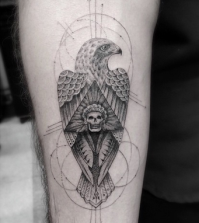- California Assembly OKs highest minimum wage in nation
- S. Korea unveils first graphic cigarette warnings
- US joins with South Korea, Japan in bid to deter North Korea
- LPGA golfer Chun In-gee finally back in action
- S. Korea won’t be top seed in final World Cup qualification round
- US men’s soccer misses 2nd straight Olympics
- US back on track in qualifying with 4-0 win over Guatemala
- High-intensity workout injuries spawn cottage industry
- CDC expands range of Zika mosquitoes into parts of Northeast
- Who knew? ‘The Walking Dead’ is helping families connect
South Korea considers legalizing tattooists

Currently in South Korea, most tattoo artists are considered to be breaking the law and can be charged with performing a medical procedure without a license. (Yonhap)
By Lee Kyung-min
The government is considering whether to set regulations for the tattoo industry, which would allow tattoo artists to become licensed professionals with the right to practice legally, an official from the Ministry of Health and Welfare said Sunday.
Currently, there are no laws regulating the tattoo industry, and only licensed health care professionals such as medical doctors, nurses, and Oriental medicine practitioners can legally pierce a person’s skin with a needle.
This means that most tattoo artists are breaking the law and can be charged with performing a medical procedure without a license.
“Because a tattoo is performed on the human body, those without proper training and background knowledge about the human body could inflict serious harm,” a ministry official said.
Tattoo artists welcome the proposed licensing system, saying they understand the concerns and are ready to undergo proper training.
“There is no government regulation for us, as our occupation is not legal to begin with,” said Choi Jeong-won, director of the Korea Tattoo Artist Association. “We cannot pay taxes even if we want to. There is no reason that we would not follow the law, if we were recognized by it.”
Tattoo parlors in Korea are often raided by the police and the penalties can force them to shut down, Choi added.
“To the government, we are just outlaws doing business illegally,” he said. “But we are artists who do this for the love of the work itself. And when the cops visit us unannounced, we have no choice but to be slapped with fines of about 2 million won,” Choi said.
The government official said similar laws exist in Japan, where drawing a tattoo on someone’s skin is classified as a medical procedure. However, Choi disputed this statement.
“I have many close friends in Japan, and the Japanese government grants them permission to open tattoo shops,” he said. “And the profession is legal in Japan.”
In response to Choi’s statement, the government official said he would look into the matter after reviewing similar cases overseas.
Choi said tattooing was a cultural phenomenon.
“In the United States, tattooing is a way of expressing oneself,” he said. “And many tattooists are popular for their sophisticated work. I wish for the swift passage of government regulations that we can follow.”










![일본 사도광산 [서경덕 교수 제공. 재판매 및 DB 금지]](http://www.koreatimesus.com/wp-content/uploads/2024/07/PYH2024072610800050400_P4-copy-120x134.jpg)


